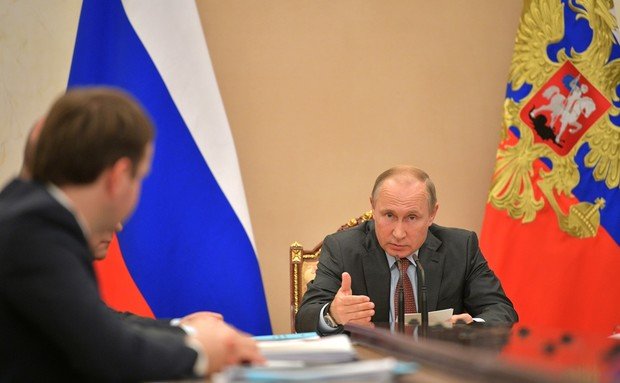Andrey Nechayev: ''Sanctions against Russia are quite soft''
Russian ex-economy minister about systemic crisis of Russian economy
In the second part of the interview with Realnoe Vremya, former Economy Minister of the Russian Federation Andrey Nechayev tells whether a crisis like 20 years ago threatens the country and the world and what quality development of Russian regions including Tatarstan can do without. The first part of the talk is here.
''Somebody ended with losing power, somebody lost his life''
Mr Nechayev, you're saying it's important to change priorities in the economy. But it's been declared at the highest level almost this spring about the necessity to put regional and municipal roads in order, investments in health, education, ecology, science have been promised, all as you are saying.
Priorities are changing but only verbally. In general, Putin's May decree can be welcomed from a perspective of declared additional investments in human capital – same health, infrastructure. But now it has come to an additional search for 8 trillion rubles to fulfil this decree. And there aren't any talks about budget redistribution, which I consider important and what I told you earlier. If another 8 trillion rubles need to be found for these good purposes, it turns out this is why authorities are increasing the retirement age, rising VAT and other taxes. But as I said, there is an alternative to it.
Can we hear about budget redistribution in autumn when Putin promised to announce the country's economic development programme in the next years?
There will be probably an address. There are serious practices of the same Strategic Development Centre chaired by Aleksey Kudrin where quite serious reformation of the whole social and economic policy is supposed. The Kremlin also has more radical offers on reforms. But it seems to me Putin won't dramatically change the economic policy. Why? The president very carefully follows his rating, his popularity, while any reforms are always a risk. And Putin knows the sad fate of many reformers from Alexander II of Russia and Pyotr Stolypin to Khruschyov, Gorbachyov and Yeltsin. Somebody ended with losing power, somebody lost his life.

''Putin's May decree can be welcomed from a perspective of declared additional investments in human capital – same health, infrastructure. But now it has come to an additional search for 8 trillion rubles to fulfil this decree.'' Photo: kremlin.ru
Sanctions aggravate the crisis, but it's not the root cause
July will mark the fourth anniversary since the European Union and the USA imposed sanctions against Russia, which affected the development of many sectors of the Russian economy. How would you assess their impact during this time?
I've said many times the Russian economy goes through a systematic crisis – a crisis of the model that was chosen as a focus in the middle of the 2000s, that's to say, orientation to only commodity export and state control of the economy, which caused awful corruption and administrative pressure on business. In this respect, sanctions aggravate the crisis, but it's not the root cause. And what we can say, these sanctions are quite soft, there are many individual sanctions. It's clear same Oleg Deripaska has been quite severely affected by sanctions. But the aluminium industry hasn't been affected so much. Of course, sanctions can very seriously influence the oil and gas sector if they go on further because they've influenced mainly the technologies linked with geological exploration, new production technologies. They've not affected production volumes so far. But it will be tough when explored reserves run out and we aren't able to develop shelf technologies. Sanctions were very painful for the financial sector and led to the large-scale devaluation of the ruble in late 2014 with corresponding inflation consequences. The western capital market was simply closed for some companies. But I will repeat sanctions aren't the root cause of the crises in our economy.
These days one of the big world banks has forecasted the world crisis in 1997-1998 could repeat in stock markets. Is it possible?
It hasn't been the case of the stock market. It has been said a financial crisis could break out, in general. But they've said many times themselves that some signs resemble the situation on the threshold of the crisis. But, on the other hand, the economy of developing Asian countries where the crisis came from then is more stable in 2018 as well as these countries' currency. This is why we should treat this forecast paying attention to a big number of reservations about it. If it's true, it will have a weaker form than it was in 1998.
Does it mean we can feel free about oil prices, which fell to even $9 then?
In 1998, not only oil was the problem, there were financial and budget problems of many developing countries, first of all, Asian countries.

''Sanctions can very seriously influence the oil and gas sector if they go on further because they've influenced mainly the technologies linked with geological exploration, new production technologies.'' Photo: Maksim Platonov
It is necessary to sharply strengthen the financial security of regions and local self-government
How should the relations between the centre and the regions develop in the near future? Is there a need for a tax adjustment in favour of the regions?
I think that here it is necessary to radically change the entire budget system. Today, most money, about 65%-70%, is drawn to the centre, the regions have 20%-25% and only about 10% remains to the municipal level of government, which is now completely financially dehydrated, especially after the mayoral elections were abolished. It turns out that local government has become an appendage of regional authorities, although this is a very important area in terms of daily life of citizens.
This system, I think, should be radically broken. It is necessary to sharply strengthen the financial security of the regions and local self-government, to return to the budget rule, which was cancelled at the end of 2008 under the pretext of the crisis (when the revenues between the federal centre and the budgets of other levels are divided equally). Thus, to expand the financial independence of the regions. It is on this basis the responsibility of regions and municipalities will be increased and created! But today, when the regions had to implement the previous May decree of the president, but they were not given money, we see a terrible imbalance in the reform of healthcare — even in the same rich Moscow, where offices were reduced in quantities and entire hospitals were liquidated, many specialists were fired. Therefore, it is impossible to shift responsibility on the regions without giving them money. This, if you want, mainstream, should be within the framework of relations between the centre and the regions: redistribution of powers and financial support. This measure, in fact, has long overdue.